March 28, 2024 Policy Hearing Takeaways
March 28, 2024
Balancing Your Budget & Thermostat: Consumer-Focused Energy Policy
Pennsylvania's pivotal role in energy production, coupled with the challenges faced by residents and businesses in accessing affordable energy, spurred a series of critical hearings titled "Balancing Your Budget & Thermostat: Consumer-Focused Energy Policy." Hosted by Representatives Cabell in Berwick, Gregory in Hollidaysburg, and Major in Ford City on March 28, April 2, and April 3 of 2024 respectively, these hearings aimed to solicit insights from experts, industries, and residents on shaping a consumer-centric energy policy for the Commonwealth. With energy costs intricately woven into the fabric of daily life, addressing these challenges is essential to mitigate inflationary pressures and sustain Pennsylvania's status as an energy powerhouse. The world is a better place with Pennsylvania energy!
The testifiers that joined the Policy Committee were as follows:
| March 28th – Berwick – Hosted by Rep. Cabell |
Full Hearing
Michael Butler - Mid-Atlantic Executive Director, Consumer Energy Alliance
Jack Monahan - Caithness Energy
Dr. Frank Polidora - Supervisor, Butler Township
Questions for the Testifiers
| April 2nd – Hollidaysburg – Hosted by Rep. Gregory |
Full Hearing
Michael Butler - Mid-Atlantic Executive Director, Consumer Energy Alliance
Emily Stipe - Senior Manager – Federal & State Advocacy, Vistra Corp.
Steven Kratz - President, Pennsylvania Chemical Industry Council
Questions for the Testifiers
| April 3rd – Ford City – Hosted by Rep. Major |
Full Hearing
Energy Expert’s Testimony:
Michael Butler - Mid-Atlantic Executive Director, Consumer Energy Alliance
Scott Waitlevertch - Manager of Government & Public Affairs, Columbia Gas of Pennsylvania
Deb Davis - Manager of Universal Services, Columbia Gas of Pennsylvania
Questions for the Experts
PA Residents Testimony:
Steve Craven - PA Resident
McKenna DeWitt - PA Resident
Questions for the Residents
| ~ Agenda, Bios, & Testimony ~ |
| 3/28 Hearing |
| 4/2 Hearing |
| 4/3 Hearing |
Michael Butler, the Mid-Atlantic Executive Director of the Consumer Energy Alliance, delivered testimony at each of the three hearings, highlighting the pressing energy challenges faced by Pennsylvanian families. He emphasized that the average household spends a substantial $3,100 annually on energy needs. Increasingly, Pennsylvanians are switching to heating with natural gas with two-thirds of Commonwealth homeowners now relying on natural gas for heating due to its cost-effectiveness compared to electricity. The price comparison is staggering, with electric heating being 266% more expensive than heating via natural gas. Mr. Butler underscored the urgent need to address Pennsylvania's energy infrastructure, warning of impending brownouts and blackouts if the state loses its baseload thermal energy generators.
Mr. Butler pointed out an important consideration when weighing our environment alongside our energy needs. He highlighted Pennsylvania's pivotal role in emissions reduction, almost entirely thanks to the state's natural gas resources, which have led to remarkable reductions in pollutants over the past three decades as compared to old coal or less efficient generators. In the last 30 years, Pennsylvania has reduced:
| o Carbon Monoxide by 80% o Nitrogen Oxide by 79% o Particulate Matter by 73% o Sulfur Dioxide by 96% o Volatile Organic Compounds by 61% o Ammonia by 45% |
Our environment is getting cleaner as we find new fuels and means to generate the energy we need. Energy generation, and our environment, are not at odds in Pennsylvania.
Mr. Butler took a moment in his testimony to caution against the growing push for electric vehicles, stressing that the current infrastructure and energy needs of homes, businesses, communities, and energy generators are not adequately prepared for this forced transition. When monumental environmental and energy policy goals are suggested they must consider the infrastructure and needs of our people. Additionally, he critiqued faux environmental stewardship efforts in Pennsylvania, attributing them largely to NIMBY concerns and emphasizing the importance of ensuring that regulations and best practices are followed within the state to mitigate environmental impact. The regulations and best practices of Pennsylvania ensure that we generate energy and products efficiently and without causing undue harm to the Commonwealth. We can’t control the business practices of China, Mexico, or our other global competitors, and by moving our energy infrastructure and manufacturing out of PA we simply ensure that more emissions and poor standards will occur outside of our borders.
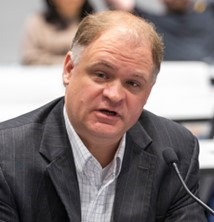 |
| WATCH |
| “America leads the world in emission reductions, and that is largely due to Pennsylvania natural gas.” Michael Butler Mid-Atlantic Executive Director, Consumer Energy Alliance |
Jack Monahon, General Manager of Operations at Caithness Energy, provided valuable insights into the contributions of energy generators to Pennsylvania's communities and economy. He highlighted the pivotal role of the Freedom Generating Station, powered by Pennsylvania natural gas, in supplying electricity to a staggering 900,000 homes and businesses. Mr. Monahon underscored the significance of energy generators as cornerstones of the community's tax base, emphasizing that tax revenue supports essential services such as schools, community spaces, and local economic activity. Energy generators like Caithness utilize PA resources to power PA homes and businesses, all while contributing to their local communities.
Mr. Monahan praised Pennsylvania's competitive energy market, which places the financial risk of new power-generating resources on investors rather than ratepayers. Pennsylvanians have the option to choose their energy provider for their home or business, and this encourages competition, investment, and new technologies in our energy market. Mr. Monahon highlighted the efficiency of Pennsylvania natural gas-powered generators, operating at an impressive 60% efficiency compared to older generators operating at 30%-50% efficiency. He also pointed out the remarkable growth in gas power generation from 2005-2020, coupled with a coinciding significant decrease in overall generator emissions by 44%.
The benefits present in Pennsylvania are a call for investment and growth to industries worldwide. Mr. Monahon outlined these key factors driving energy generators' investment in Pennsylvania, namely the state's competitive energy market, abundant natural resources, existing infrastructure, and skilled workforce. Were it not for the looming threats of energy taxes and permitting woes the Commonwealth would be home to far more state-of-the-art energy generators.
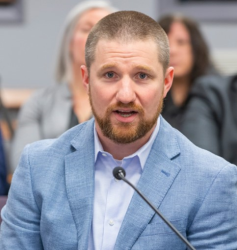 |
| WATCH |
| “Consumer demand for electricity is expected to continue to rise.” Jack Monahon General Manager of Operations, Caithness Energy |
Emily Stipe, Senior Manager of Federal & State Advocacy at Vistra Corp, highlighted the importance of competitive energy markets in delivering optimal outcomes for consumers. She emphasized that while 47% of consumers prioritize reliability and 36% prioritize affordability, only 10% prioritize environmental friendliness. Reliability and affordability must come first to meet the priorities of Pennsylvania’s energy consumers.
Mrs. Stipe underscored the increasing energy demands driven by factors such as data centers, electric vehicles/equipment, and consumer demand, which are projected to grow by 1.6% annually. She raised concerns about potential resource inadequacy facing PJM, Pennsylvania's electric grid, by 2027, noting that only solar and wind projects are poised to go online due to subsidies but are insufficient to meet our grid's baseload needs. Instead of sporadic solar and wind energy, Mrs. Stipe proposed future baseload generation solutions including hydrogen blending into existing natural gas, small modular nuclear reactors, continued reliance on PA’s existing resources, and advancements in long-term energy storage technology, to address these challenges and ensure grid reliability and sustainability in the coming years.
 |
| WATCH |
| “Too often, grid reliability is taken for granted and is not included in the conversation regarding policies impacting our industries.” Emily Stipe Sr. Manager - Federal and State Advocacy, Vistra Corp. |
Scott Waitlevertch, Manager of Government and Public Affairs at Columbia Gas, and Deb Davis, Manager of Universal Services at Columbia Gas, highlighted the importance of utility-provided customer assistance programs in alleviating the burden of energy costs for residents. Depending on a resident’s financial situation they may be eligible for assistance. Mr. Waitlevertch and Mrs. Davis emphasized that all utility companies offer such programs to assist with bill payments, with a portion of customers' bills automatically diverted to cover the costs of low-income customers. They clarified that these utility-provided assistance programs are separate from state and federal initiatives such as LIHEAP or CRISIS, and they offer assistance tailored to the income levels of customers.
Additionally, Mr. Waitlevertch and Mrs. Davis informed residents about the availability of WarmWise LIURP funds, which can be received to increase energy efficiency and save an average of 15%-22% on annual energy costs. If energy bills are consistently high, perhaps the best means to address the cost is for a home to increase in efficiency. They noted that the utilization of these customer assistance programs is steadily growing each year, indicating their continued importance in supporting residents facing financial challenges with their energy bills. Aid to those in energy-related need should always be available, but as energy insecurity grows the root cause of energy prices – lack of extraction and generation potential – must be addressed. Without recognizing the root of the issue Pennsylvanians may all someday struggle with affording their energy needs.
 |
| WATCH |
| “We are seeing it [utility assistance programs] grow, and we’re certainly working very hard to make it grow.” Deb Davis Manager of Universal Services, Columbia Gas |
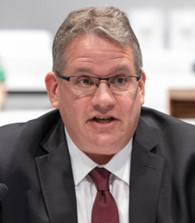 |
| WATCH |
| “Any energy policy must look at the impact on customer’s bills.” Scott Waitlevertch Manager, Government and Public Affairs, Columbia Gas |
Dr. Frank Polidora, Supervisor of Butler Township, provided firsthand insights into the impact of rising energy costs on local residents and communities. He revealed that in the past year, Butler Township's electric costs surged by 18%-26%, significantly burdening consumers. Dr. Polidora emphasized that these escalating energy costs limit the township's ability to adequately serve its residents, as maintenance expenses rise, roads deteriorate, and community services become more constrained. He also addressed a proposed solar farm in the township, noting that it would not offer cheaper electricity to locals and would only generate nominal tax revenue. In short, the proposed solar farm would take a tremendous amount of fertile land and offer a pittance of energy and tax revenue to the community.
Furthermore, Dr. Polidora highlighted the confusion among Pennsylvania residents regarding their energy bills, particularly regarding deciphering components such as the "PA Delivery Charge" and the "System Improvement Charge," underscoring the need for clarity and transparency in utility billing practices to empower consumers to make informed decisions about their energy usage. Residents and businesses should not struggle to make sense of their energy usage or bills.
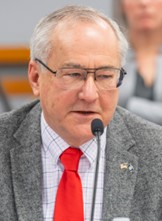 |
| WATCH |
| “Energy needs to be dependable and inexpensive!” Dr. Frank Polidora Supervisor, Butler Township |
Steven Kratz, President of the Pennsylvania Chemical Industry Council, provided valuable insights into the factors influencing investment decisions in the state's chemical industry. He emphasized that policies affecting permitting timelines, regulatory costs, operating costs, and energy reliability play a critical role in determining whether investments are directed to Pennsylvania or its competitors. Mr. Kratz highlighted the importance of market-driven policies in creating a level playing field for Pennsylvania businesses, enabling them to compete effectively. Furthermore, he underscored the safety and sustainability benefits of products manufactured in Pennsylvania, asserting that they are superior for consumers and the environment compared to those produced in competing countries. Mr. Kratz's testimony emphasized the significance of policy frameworks in shaping the competitiveness and sustainability of Pennsylvania's chemical industry while advocating for measures that promote investment, innovation, and environmental stewardship within the state. With Pennsylvania energy businesses thrive and Earth is a cleaner place for all.
 |
| WATCH |
| “Government policy works in 2 to 4 year schedules while businesses look out 10 to 20 years.” Steve Kratz President, PA Chemical Industry Council |
McKenna DeWitt, a Pennsylvania resident, along with Steve Craven, a resident and business owner, offered poignant perspectives on energy choice, consumer concerns, and financial constraints faced by everyday Pennsylvanians. They acknowledged the value of energy choice but expressed concerns about predatory practices by some energy providers, who incessantly call and mislead consumers. Miss DeWitt, in particular, was recently misled into accepting a “deal” from an energy provider that massively increased her monthly bill. Having the ability to choose your energy provider is a great resource for PA residents, but the process can still be confusing and opens the door for manipulative bad actors.
Miss DeWitt and Mr. Craven underscored the frustration of average Americans witnessing foreign countries and nationals receive tax dollars while our domestic needs remain unmet. They emphasized that, for Pennsylvania consumers, environmental concerns often take a back seat to affordability and reliability of energy services. First and foremost, Pennsylvanians want reliable and affordable energy, especially in times of inflation.
Miss DeWitt highlighted the financial strain of utility bills, expressing that if she were not spending her money on energy, it would be allocated to essentials like food and savings, reflecting the tight financial situations experienced by many residents. Mr. Craven, likewise, noted that any energy expense eats into his business and his customer’s pockets. Their testimonies shed light on the complex realities faced by Pennsylvania residents navigating energy choices, financial constraints, and competing priorities.
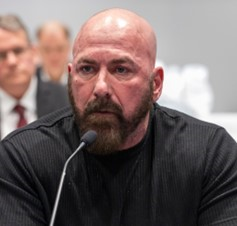 |
| WATCH |
| “I hope through what you’re doing we see results, we see good legislation.” Steve Craven PA Resident |
 |
| WATCH |
| “My electric bill didn’t go over $70 this summer, and now it’s in the $200s!” McKenna DeWitt PA Resident |
Each of the hearings within the series held by the Pennsylvania House Republican Policy Committee offered invaluable insights on energy-related concerns from a diverse range of stakeholders. Testimonies from industry experts, residents, and advocacy groups highlighted the urgent need for policies that address rising energy costs, promote transparency in utility billing, prioritize reliability and affordability, and foster a competitive energy market. Increasingly, Pennsylvanians are relying on energy assistance programs to make ends meet, and this need not occur under truly consumer-focused energy policy.
Despite the challenges outlined, there is cause for hope. Forward-thinking Republican policy proposals and legislation that prioritize consumer needs are ready-and-waiting to be turned into law. By championing measures to enhance energy infrastructure, streamline regulatory processes, and incentivize investment in long-term energy solutions, Pennsylvania can lead the way in ensuring energy affordability, reliability, and environmental stewardship. Through collaborative efforts and innovative solutions, Pennsylvania Republicans are poised to empower consumers, stimulate economic growth, and secure a prosperous energy future for all Pennsylvanians. Our world is a better place with Pennsylvania energy.